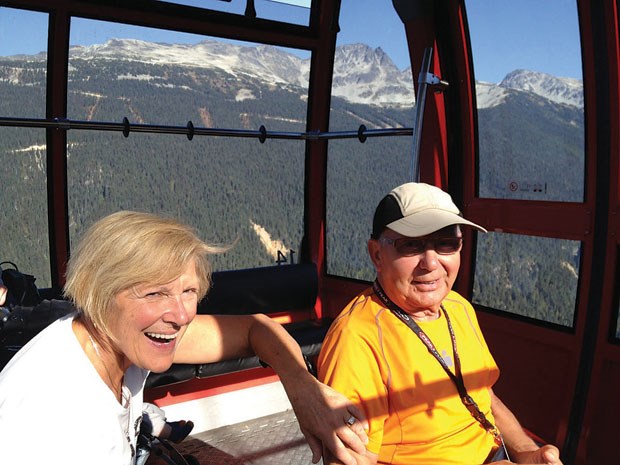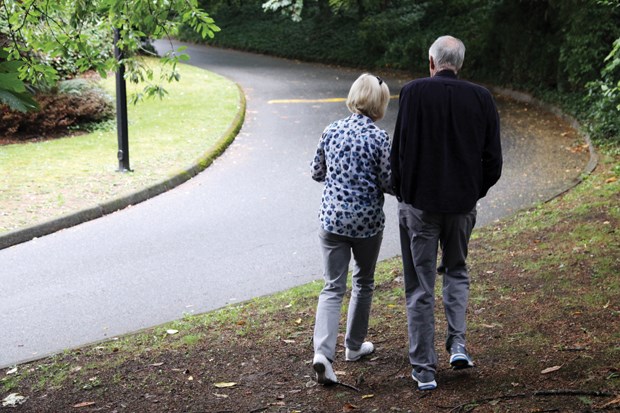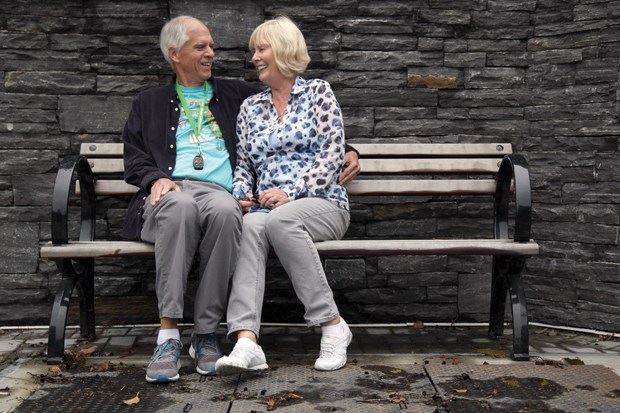Bryan Chalmers has led a full life, accomplishing goals out of reach for most: a Canadian speed skating title, athlete of the year at his university, a sought-after statistics professorship, world travel.
Fragments of those memories Bryan will recall intermittently. But when asked his age, the man who could once make sense of a jumble of numbers, struggles.
“That’s a tough one,” says Bryan, softly, through a smile that makes his eyes twinkle.
He’s 73. Bryan’s wife, Judy, gently reminds him. Married close to 30 years, the couple relax on an early September afternoon in the living room of their new condo set on the hill above Park Royal.
Except in Bryan’s mind, he thinks they still live at the base of Mount Seymour. Judy explains the transition of moving has been hard on Bryan and perhaps exacerbated his Alzheimer’s disease.
A talented piano player, Bryan cherished two uprights that furnished their old home, including one given to him by his grandfather. Often when he would sit down at the keys, a dramatic rendition of Chopin’s
Fantasie Impromptu would emanate.
In the early 2000s, Judy noticed something was off with Bryan. He was taking longer to complete projects, and all those great classical piano pieces Bryan knew by heart were not registering in his mind anymore.
“He just wouldn’t sleep. He would stay up all night long and plot at things,” recalls Judy.
Judy took photos of Bryan by the pianos the day they were taken away from their home.
“He couldn’t play them anymore,” says Judy. “It was almost like rubbing it in. It was sad — really, really sad. That really cut him up.”
As Bryan’s neurodegenerative disease progresses he loses pieces of his identity, his intellect, his agility — and the most basic motor skills.
“It’s like having a toddler again,” explains Judy.
Bryan requires round-the-clock supervision. He is unable to find the fridge. He has mistakenly put on Judy’s pants. Most alarming was when Bryan wandered away, wound up in the adjacent building and walked into another apartment.
“That was bad,” says Judy.
The life the Chalmers once knew, routinely socializing with friends and playing golf, has steadily eroded since Bryan’s diagnosis.
Bryan says the weather was too terrible this summer for golf, and also they have been busy. Judy just smiles.
“There’s a lot of denial there,” she says later, in private.
When they do socialize, it’s no secret that Bryan is sick. For example, he might start eating food off the plate of the person seated next to him at a dinner party.
Friends are good about it, says Judy. Those in the greater community not acutely aware of Alzheimer’s, however, might need some coaching in compassion, she adds.
The couple’s daily routine is somewhat structured. Bryan attends Alzheimer’s support groups three days a week in West Vancouver, which affords Judy some respite.
The remainder of the time is spent making sure Bryan isn’t sitting around at home alone with his thoughts, because he will become agitated. He’s lost the ability to amuse himself by using the computer or reading books.
So the two of them will go on a lot of walks, around their neighbourhood or down to Ambleside. Going out for coffee is Judy’s other go-to distraction.
While it’s a therapeutic exercise for Bryan, it asks a lot of patience of Judy. The intellectual conversations they once enjoyed, about shared worldly experience, have devolved into repetitive “rubbish.”
Then there are Bryan’s delusional episodes. His doctor suspects they might be brought on by a branch of Alzheimer’s called Lewy body dementia.
“For example, he thinks he was present at the Kennedy assassination and missed the bullet,” says Judy.
Or that he was there when the first atomic bomb went off. Bryan also believes he’s been selected for the first moon walk — at one point carrying around a sheet of paper with notes on how to prepare for going to space.
“There’s no point in denying it,” says Judy. “It’s no good. It’s like talking to a wall, because it (the delusional story) will come back again.”
Late actor Robin Williams was afflicted by Lewy body dementia, according to a coroner’s report that also noted that Williams had been suffering “a recent increase in paranoia.”
Of all the irrational words Bryan has spoken, the worst is when he tells Judy he knows she’s going to abandon him.
When asked what scares him most about his Alzheimer’s, Bryan has a moment of clarity.
“Probably that you are going to become some vegetable in the future,” he says. “Everybody is kind of worried about themselves and what’s going to happen if I lose this or that.”
Judy is somewhat depressed about all the uncertainty as Bryan’s Alzheimer’s advances with each passing day.
“There’s nothing to be excited about in the future,” she says. “Just knowing how long it’s going to take. The thought of being alone. I mean, Bryan is my companion.”
Finding a cure
Bryan is one of more than 70,000 people in B.C. living with Alzheimer’s disease or another form of dementia.
With a surge of baby boomers entering their golden years, cases of dementia-like diseases are expected to climb dramatically. It’s estimated that by 2031, 1.4 million Canadians will be living with dementia, nearly double the number today.
That sobering statistic drives Dr. Haakon Nygaard, a UBC neurologist who hails from Yale University and is a leading researcher in the study of Alzheimer’s, to find a cure.
“I think it’s hard to overstate this: we are entering a health-care crisis in the whole world, including Canada,” said Nygaard, in an interview with the News last week. “We are simply not going to have enough money just to take care of the people who are expected to get dementia.”
The most common form of dementia, Alzheimer’s, is irreversible.
The underpinning of Alzheimer’s is the build-up of beta-amyloid proteins that permanently destroys connections between nerve cells that control every aspect of a person’s daily life.
From personality to language skills to orientation of environment – all of these functions reside in very specialized areas of the brain and they are connected to each other, so if you lose both the original nerve cells as well as the connections, you end up with Alzheimer’s, explains Nygaard.
Memory loss is the most common symptom of Alzheimer’s and a hallmark sign that helps doctors differentiate from other types of dementia. Initially, only short-term memory is impaired. Long-term memory may be affected too, but more so towards the end of life.
Alzheimer’s trajectory is unpredictable.
On average, those with Alzheimer’s survive for eight to 10 years after diagnosis. In some cases, people can deteriorate rapidly and pass away after three years while others might live as long as 20 years with the disease.
There are several medications that can somewhat ease Alzheimer’s symptoms such as memory decline, but currently there is no cure.
The scientific community is cautiously optimistic about ongoing clinical trials to find treatments to slow the progression of Alzheimer’s.

Nygaard and his team of UBC researchers recently repurposed a decades-old experimental drug called saracatinib, originally developed as a cancer treatment, for use in a proposed Alzheimer’s drug trial.
By “piggybacking” on a drug that’s already been developed, Nygaard estimates they have saved 10 years thanks to already-approved safety testing and toxicology analysis.
Nygaard is anticipating having Alzheimer’s patients enrolled in the trial by year’s end. Pretrial research has shown encouraging results: saracatinib inhibited or blocked a protein called Fyn kinase, which is linked to brain cell damage.
In certain forms, Alzheimer’s is hereditary. The disease can start up to 30 years before any symptoms occur, says Nygaard.
And while there is a way to screen for Alzheimer’s early on – through brain PET scans that can detect amyloid deposits – it would be futile to do so on a widespread scale in the absence of a drug to prevent the disease’s progression, says Nygaard.
“It’s not something that I think the (Canadian) government is eager to launch because it’s very expensive,” adds Nygaard. “Funding is tough these days.”
Nygaard says part of the problem, when it comes to research funding priorities, is that Alzheimer’s progresses relatively slowly when compared to some other diseases, coupled with people’s perception of it striking elderly people.
But the tide is changing, says Nygaard, because this “devastating disease” is becoming so prevalent now, and it doesn’t just affect the patient but also the whole family.
On Monday the national New Democratic Party pledged $40 million over four years to establish a Canada-wide dementia strategy, predicting annual economic costs associated with dementia will reach $293 billion by 2040.
“I foresee a future where people in their middle age will get screened and – once we have an effective (Alzheimer’s) therapy – will start therapy long before they would have any symptoms,” says Nygaard.
Climbing for a cure
Two families with a North Shore connection are literally climbing mountains to champion funding for Alzheimer’s research –because it’s a matter close to their hearts.
Lower Mainland police officers Lisa Heiberg and Doug Spencer and mother-daughter duo Erika and Kim Durlacher are part of a small team selected to hike to the summit of Mount Kilimanjaro Sept. 23-29.
Each climber has raised $10,000 to take part in the annual Ascent for Alzheimer’s, organized by the Alzheimer Society of British Columbia. Closer to home, the Mount Kilimanjaro Grouse Grind for Alzheimer’s fundraiser where teams complete a minimum of seven consecutive Grinds – the equivalent of climbing the 19,340-foot-high Mount Kilimanjaro – goes on Sept. 27. That’s the day the B.C. team summits the African mountain.
Lisa and Doug are hiking in honour of Doug’s dad, Gord, a former Vancouver police officer who lived in North Vancouver and died from Alzheimer’s in August 2014.
“He was a very outgoing, personable person,” recalls Doug.
When Lisa approached him with the idea to climb Kilimanjaro, Doug jumped at the chance. After being vetted for physical capability, the couple was chosen to join the team.
To prepare for Kilimanjaro they have been doing a series of hikes around the South Coast and putting in a lot of extra hours at the gym.
“Pretty much you are told to expect like you are going to have a kick-ass hangover when you are hiking – that’s what altitude sickness feels like,” says Lisa.
Erika and Kim, meanwhile, are climbing Kilimanjaro for their family patriarch, Peter Durlacher, 83, who is in the final stages of his battle with Alzheimer’s.
Confined to a wheelchair, Peter also can no longer speak; however, the couple married close to 40 years has found one special way to communicate.
Erika will walk over to the CD player and put on a song that’s poignantly familiar to both of them. “I stretch out his arms and pretend like we are dancing,” says Erika, recalling a time when she and Peter would twirl around in sync in European polka competitions.

Caregiving takes its toll
Bryan and Judy walk side by side in a forested area they often escape to, adjacent to their complex.
“We’ll whip up these stairs,” says Bryan, standing at the base of a steep staircase boasting no less than 50 steps.
Bryan turns the physical exercise into a mental challenge for himself – counting each of the stairs. Later he’ll try to recall how many there were.
Walking along a canopied trail at the top of the slope, he sees a piece of wood and tries “10 to 20 times” to commit it to memory. Recalling something from 70 years ago is easier for him.
“I can tell you every single thing about my time on the Red River,” says Bryan. “My parents had a farm. There were hundreds and hundreds of flowers.”
His eyes twinkle again when asked about his 1959 Canadian speed skating title.
“I missed the Olympics by four feet,” says Bryan.
He walks with his hands stuffed in the pockets of his cardigan; a set of house keys hangs around his neck.
“I’m supposed to be sick, but yet I can walk up Mount Seymour. So how do you say I’m sick, right?” offers Bryan after a lull in the conversation.
Later on, in private, Judy divulges she can’t imagine putting her husband in a nursing home. But the caregiving role has taken a toll on her.
“Nobody understands how intense it is,” she says.
Women account for 70 per cent of caregivers to people with dementia, says the Alzheimer Society of B.C., with up to 75 per cent of caregivers overall developing a psychological illness as a result.
Judy benefits from a caregiver focus group offered by the North Shore Community Resources Society, as well as other seminars and tele-workshops on the topic of dementia.
Bryan, meanwhile, attends programs in West Vancouver – Minds in Motion and Memories and More – where he meets with recreational and occupational therapists for mental stimulation designed to slow cognitive decline.
Bryan misses going to My Parkgate Break – a unique program for people with dementia in the Seymour area. He was receptive to the activities including art, laughing yoga and music therapy.
However, there is also a financial burden for families to bear. Home care costs can run from $28 to $32 an hour, says Judy.
She has already looked into residential care home rates, learning it will cost 80 per cent of Bryan’s retirement income up to a maximum of $3,500 a month.
“So there that is a very scary thing for me and it makes the future uncertain,” says Judy.
September is World Alzheimer’s Month. For more information on fundraising events, visit alzheimer.ca/bc.




